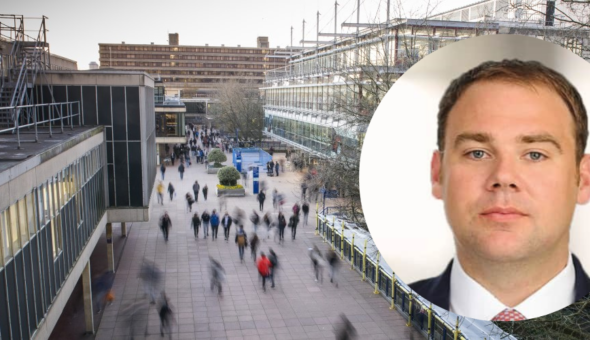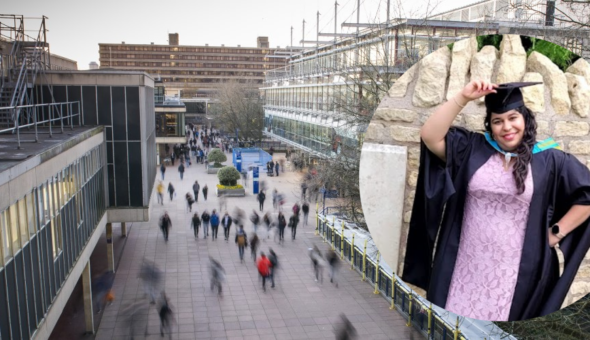From first in her family to go to university to one of the UK's first psycho-oncologists, Dr Maggie Watson (BSc Sociology 1974) shares her story of how Bath opened up a whole new world...
“I’ve been able to travel the world and meet many inspiring and wonderful people as a result of my career as a clinical psychologist in oncology. How lucky I’ve been. The luckiest thing of all was that moment when I heard that Bath would offer me a place to study Sociology back in 1971. It changed my life!
“I was born and raised in Easington Colliery, County Durham – where the film Billy Elliott was based. I’m the daughter of a coal miner and my mother was a housewife. I failed to get a place at grammar school and went to the local secondary modern. I left school at the age of 16, but passed the entrance exams for the Civil Service.
“While working in the Civil Service, I decided to attend night classes alongside working full-time, and managed to get three A levels. Throughout this time I was encouraged by a young psychology student I met, who was studying at Newcastle University. He was later to become my husband and encourages me still to this day!
“I was the first person in my family to go to university. When I got my PhD, it was announced in the local paper – ‘Easington woman gets Doctor’s degree’. Amazing that it should have been so rare!
Inspiring mentors
“I was drawn towards psychology, which was taught within the sociology course at Bath, and I followed it as a chosen option over the whole three years of my degree. Professor Helen Weinreich-Haste supervised my dissertation, which was on self-esteem and race in schoolchildren.
“Helen was not only an inspiring lecturer, but also opened up issues relating to women through facilitating the ‘consciousness raising’ groups that were established and held around that time. Women’s rights!
“She herself had been recently appointed to Bath as a lecturer at the time I was a student and she was a young mother developing her career, something I admired greatly. A very special mentor! I have a lot to thank her for.
Varied pursuits
“As a student, I was focussed, politically aware and determined to get the best grades possible since I was considering an academic career after graduation. I was a member of various groups – drama, women’s group, socialist and debating societies. Bath was such a great place to study and it was also a lot of fun to live there. I went to lots of on-campus discos, visited many country pubs, drank cider and learned to play bar billiards!
“One of the things I valued about my time at Bath was the opportunity to do unusual things. For example, I studied criminology and was able to interview prisoners at Leyhill Open Prison. I attended a debate – they had their own debating group – in Leyhill and also organised a debate where prisoners were allowed to join the University debating group.
“During my final undergraduate year I became more interested in exploring mental health issues and how low self-esteem impacts the development of depression. I was, as a corollary, interested in what was meant by ‘positive mental health’. Based on this I made an application for a PhD studentship to a number of universities and was accepted at Sheffield University. I completed a PhD on cognitive processes in the development of learned helplessness and depression.
“After my PhD I worked in academic psychology but very quickly decided that I wanted to become a clinical psychologist. I trained in this subject and in 1986 moved to the Royal Marsden Hospital, where I spent most of my career. I was the first full-time clinical psychologist at this leading cancer treatment centre.
Holistic care
“When I first began to work in oncology, the specialism of psycho-oncology – which focuses on psychosocial care of people with cancer – didn’t really exist. It’s surprising how the field then was so under-developed, while it now attracts so many psychologists globally as a career option. I was able to do some very pioneering things to establish the discipline in the UK and globally, including launching the British Psychosocial Oncology Society.
“I’m President Emeritus of the International Psycho-Oncology Society and received their Lifetime Achievement Award in 2013. I launched the leading academic publication Psycho-Oncology Journal 30 years ago, together with my inspiring US colleague Dr Jimmie Holland. I continue as Editor-in-Chief to this day.
"I was also recently awarded the first Society of Health Psychology 'SfHP Distinguished International Affiliate' Award within the American Psychological Society (APA).
“Most important of all is how the mental health of people with cancer is now considered an important part of their care all over the world. It’s great to think that people suffering from cancer have been helped to cope and are now being supported in terms of their mental, as well as their physical, health.”
Respond



